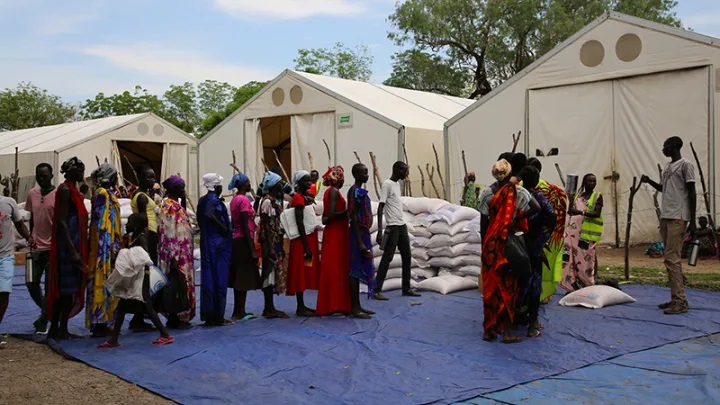With the combined socioeconomic effects of COVID-19, the Russia-Ukaraine war and climate change it is safe to say Africa has never had it so bad.
It is little wonder that the African Union convened an Extraordinary Summit dedicated to addressing humanitarian challenges in Africa.
The one-day summit, which was also meant to be a preparatory to a donor conference, was held in Malabo the capital of Equatorial Guinea on May 27, 2022. Indeed, in the last two years, the continent has faced challenges not only of development but how its population could cope with the effects of added problems occasioned by the pandemic.
This is a continent, which for years has been battling with refugee problems following numerous wars in various parts.
In Nigeria, for example, the number of internally displaced persons is growing by the day due to the activities of bandits and Boko Haram insurgents. Many of our compatriots were forced out of the country and now living in Niger Republic, Chad and Cameroon as refugees.
Similarly cost of bread and fertilizers is on the rise following the war between Russia and Ukaraine.
The Chairperson of the African Union Commission, Mr Moussa Faki Mahamat, noted that the humanitarian emergencies in Africa are a permanent source of concern. “They are illustrated by figures and statistical data drawn up and compiled by the United Nations Specialised Agencies. In the 15 most affected Member States, 113 million people are waiting for emergency assistance in 2022.
“The paradox of humanitarianism lies in the discrepancy between the urgent nature of the situations of human distress to be taken care of and the poignant need to defer this care because of the lack of or insufficient financial resources,” the AUC chairperson said.
The President of the Republic of Senegal and Chairperson of the African Union, Macky Sall, noted the scale and persistence of humanitarian emergencies on the continent, saying, “According to the United Nations Global Humanitarian Overview 2021 report, six of the most significant and urgent crises with alarming humanitarian consequences are found in Africa, with more than 30 million internally displaced people, refugees and asylum seekers”.
He said the fate of millions of refugees, and IDPs calls for inclusive development, following the principles of social justice, so that each citizen feels heir to a part of the national resources.
However, the paradox of this dire situation is that Africa has all that is required to make the continent prosperous and its citizens lead a comfortable life. It is our belief that the situation found in Africa was self-inflicted largely due to bad governance which has resulted in negative indices in all facets of human development.
Africa also found itself engaged in so many unnecessary wars with some lasting for decades, which made millions of its people to be internally displaced or become refugees in other countries.
The combined effect of climate change, which led to food shortages across the continent, especially in the Sahel region concluded the predicament facing the continent.
We welcome the fact that the summit discussed the challenges affecting humanitarian assistance in Africa, advocating for sustainable financing for humanitarian needs, and mobilizing resources for humanitarian response. It also endorsed resilience programmes for populations affected by complex crises, famine, and other disasters. We are also delighted that the meeting discussed the final moves to set an African Humanitarian Agency to deal with humanitarian situations across the continent.
This paper is also delighted at the numerous pledges of assistance by the United Nations and the European Union to assist our leaders in addressing the situation.
However, beyond this the onerous task of addressing the situation remains with us as Africans and especially our leaders. It is pertinent that African leaders take the advise of the Chairman of the Union and Senegal’s President Macky Salls, who urged fellow colleagues to tackle the root causes of humanitarian crises on the continent reminding them that “prevention is better than cure’’.
We want to reiterate that Africans must take charge of their destiny. No one will do it for us. This was made clear at the height of COVID-19 pandemic when the developed countries cornered the vaccines for their citizens despite all pleas.
It is time for the AU to put in place a robust mechanism to ensure that the African Humanitarian Agency comes on stream to address the myriad of crises facing the people. Beyond this, the organisation must also seek partnership of non-governmental organisations, global partners and individuals to address the various situations.
We also appeal to African leaders and other international organisations to redeem their pledges to enable them to help in addressing the various humanitarian crises on the continent. More importantly, African leaders and citizens must realise that time is not on our side. The earlier we address the root causes of our conflicts and take measures to contain the devastating effects of climate change the better it will be for this generation and those yet unborn. Africa cannot continue to fold its arms and expect miracle from other continents.

 Join Daily Trust WhatsApp Community For Quick Access To News and Happenings Around You.
Join Daily Trust WhatsApp Community For Quick Access To News and Happenings Around You.


